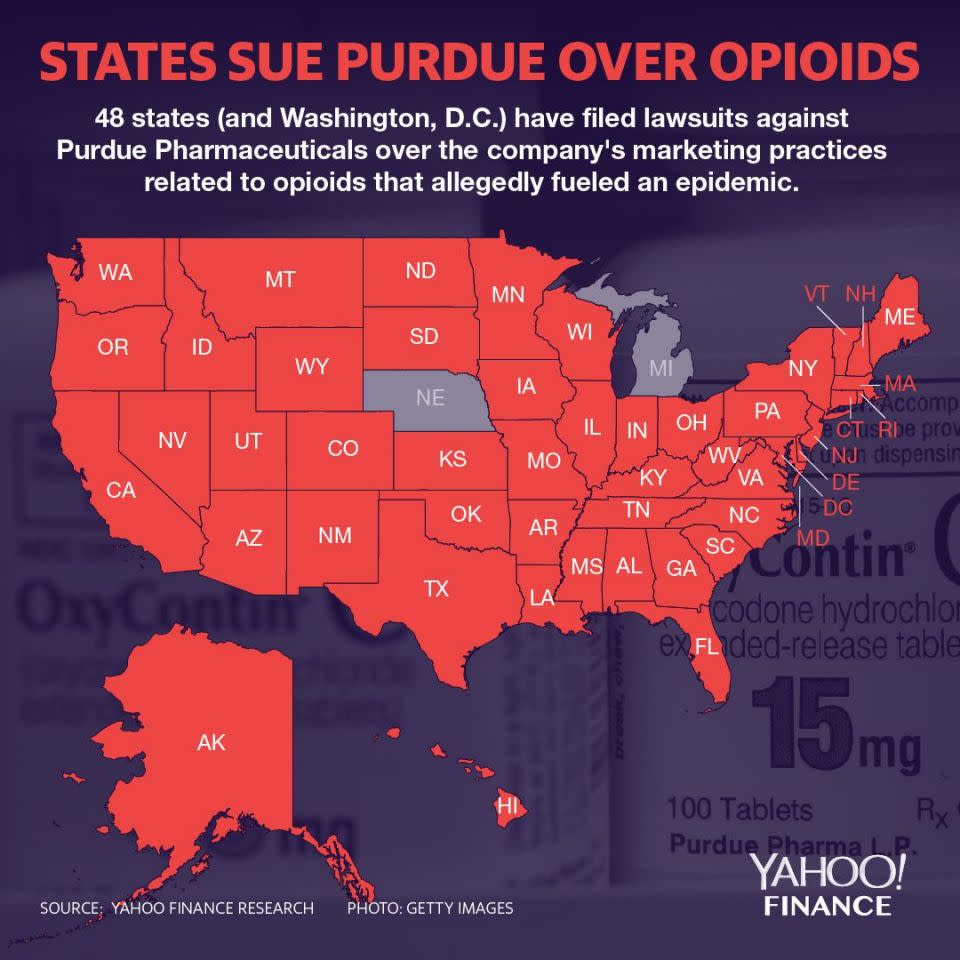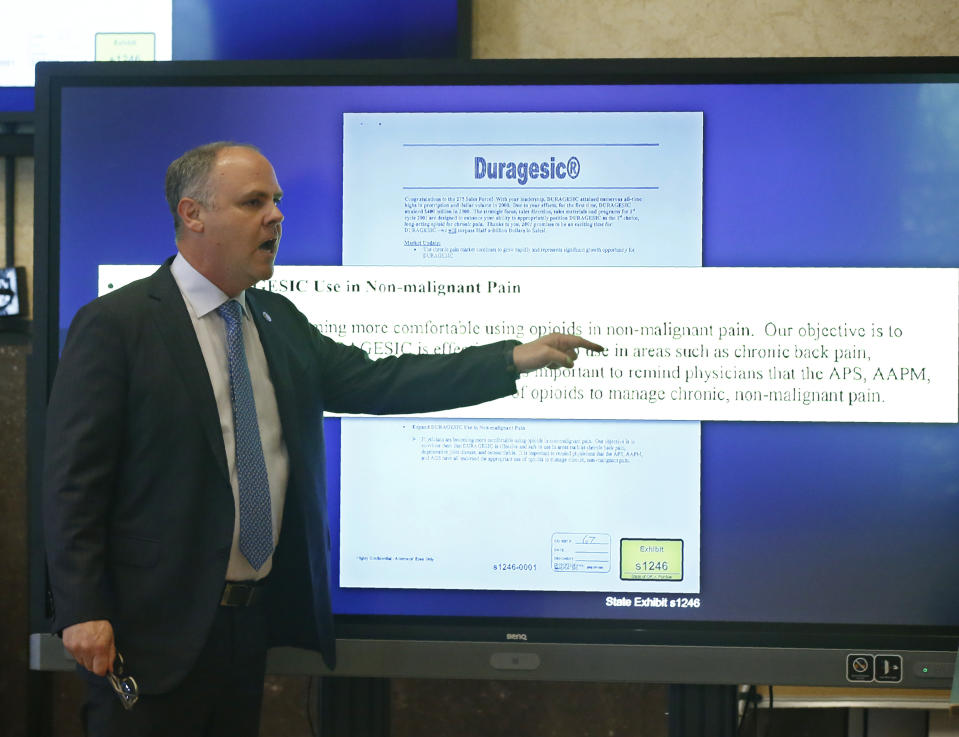The opioid epidemic reckoning is happening — kind of
Although opioid addiction has been impacting the U.S. for decades, it was only recently that pharmaceutical companies started to be held accountable by the public.
On Sept. 11, Purdue Pharma, the company that created and manufactures Oxycontin, a painkiller that’s found itself in many lawsuits, reportedly reached a tentative settlement. According to the New York Times, the terms include the Sackler family paying $3 billion in cash over seven years and no admission of wrongdoing. The company will also dissolve into a new one that will still sell OxyContin — with the revenue going towards the plaintiffs. Furthermore, Purdue is expected to file for bankruptcy.
The Times described the agreement as “landmark moment in the long-running effort to compel Purdue Pharma... to have their day of reckoning for the deaths of hundreds of thousands of people from overdoses and the calamitous systemic costs.”
Purdue had a different take on the news.
“While Purdue Pharma is prepared to defend itself vigorously in the opioid litigation, the company has made clear that it sees little good coming from years of wasteful litigation and appeals,” Purdue Pharma said in a statement to Yahoo Finance. “The people and communities affected by the opioid crisis need help now. Purdue believes a constructive global resolution is the best path forward, and the company is actively working with the state attorneys general and other plaintiffs to achieve this outcome.”
‘They’re certainly going to be paying a great deal of money’
On August 27, Johnson & Johnson (JNJ) was ordered to pay $572 million to the state of Oklahoma. This came after a judge ruled that the company breached the state’s public nuisance law by using “false, misleading, and dangerous marketing campaigns [that] have caused exponentially increasing rates of addiction, overdose deaths, and Neonatal Abstinence Syndrome.”

J&J, a consumer product company, made its own own opioids through its Janssen Pharmaceuticals subsidiary.
“Janssen did not cause the opioid crisis in Oklahoma, and neither the facts nor the law support this outcome,” Michael Ullmann, Executive Vice President, General Counsel, Johnson & Johnson, said in J&J’s official statement. “We recognize the opioid crisis is a tremendously complex public health issue and we have deep sympathy for everyone affected. We are working with partners to find ways to help those in need.”
Between Purdue Pharma and J&J, “they’re certainly going to be paying a great deal of money,” Michelle Mello, a law and health research and policy professor at Stanford University, told Yahoo Finance. “I don’t think there’s any doubt about that. I think the only question is whether they will manage to reach a global settlement ahead of the October trial. There will be a reckoning financially. They will also, if they have not done already, have to reckon with other marketing practices that need to change.”
‘A wave of a reckoning’
There is growing resentment towards pharmaceutical companies across the country — a recent Gallup poll indicated that the pharmaceutical industry is the lowest-rated industry in the U.S.
As of August 30, 2019, 48 states and the District of Columbia have filed lawsuits against Purdue Pharma over the company’s marketing practices related to opioids. In New York, is accused of using aggressive, sophisticated marketing strategies in addition to “an army of sales representatives and unbranded ‘patient advocacy’ websites” to change opioid prescribing norms into the 2000s.

“Arguably, Purdue Pharma had maybe as much of a role, if not more, than Johnson & Johnson in the sense that I think they may have sold more opioids, and certainly their Oxycontin product is a leading seller,” Haffajee said. “And some of their actions were kind of the most seemingly egregious that we’ve been hearing about.”
A Massachusetts lawsuit against the company states that “Purdue’s most powerful tool of deception was sending sales representatives to promote opioids to Massachusetts doctors, nurses, and pharmacists face to face.”
The Pennsylvania lawsuit was blunt: “Simply stated, Purdue took advantage of addiction to make money.” And in its case with the state of Oklahoma, Purdue reached a $270 million settlement.
The news “is kind of the start of a wave of reckoning that’s going to happen,” Haffajee said. “The question is: In what way? I think what’s probably going to happen is other companies and maybe Johnson & Johnson, although they’ve been pretty hard nosed about not accepting any responsibility, are going to see this ruling and then be more likely and prone to settle, and maybe pursue a global settlement in the federal multidistrict litigation.”

‘Unprecedented’
Nearly 400,000 people died from an opioid overdose between 1999 and 2017, according to the Centers for Disease Control (CDC), and the number of overdose deaths linked to opioids was six times higher in 2017 than it was eight years prior. An average of 130 Americans died every day of an opioid overdose in 2017, according to CDC data.
The crisis has even reached professional sports — it was revealed earlier in the month that Los Angeles Angels pitcher Tyler Skaggs died as a result over an overdose involving fentanyl, opioids, and alcohol. As a result, Major League Baseball and the players’ association have stated that there will be a discussion about further testing for opioids.
With the large scale of people who have died from an opioid overdose since 1999, why did it take until only recently for pharmaceutical companies to be held accountable in a court of law?
Between 2000 and 2016, the aforementioned epidemic reared its ugly head in steadily increasing opioid overdose death numbers. Men overdosed at a rate of 4.4 per 100,000 individuals in 2000, and surged to 18.1 per 100,000 in 2016. For women, they overdosed at a rate of 1.6 per 100,000 in 2000, and jumped to 8.5 in 2016, according to data from the Kaiser Family Foundation.
During those years, the opioid crisis cost the U.S. about $37.8 billion in state and federal taxes, Yahoo Finance previously reported.
“Like all mass litigation, there’s just a sort of life cycle to it where it begins with a few individual suits and it takes a few years for plaintiff’s attorneys to recognize that they’ve got a really big set of claims on their hands, that they’re organized in a way that permits mass litigation to be brought and we’ve seen that with tobacco,” Mello said. “It just takes a while to get organized. Nothing has ever come together at this scale before. It’s just really unprecedented the scale of this particular piece of litigation, so that takes time too.”

What’s next
While Purdue Pharma and Johnson & Johnson’s cases are arguably the most high profile, at least for the time being, those companies aren’t the only ones finding themselves embroiled in lawsuits related to opioids. Endo and Allergan are reportedly working to reach settlements in their related cases, according to NPR. And earlier this year, opioid drugmaker Teva Pharmaceuticals agreed to pay $85 million in a settlement with the state of Oklahoma.
A question that remains is what these rulings mean for other pharmaceutical companies going forward.
“Some of what we’re seeing is companies, manufacturers, and distributors being much more careful about how they market products, how they ship them, how they supply them,” Haffajee said. “The distributors being much more vigilant about suspicious orders and reporting those … they’re also doing things like voluntarily engaging in education campaigns … The opioid agonists and partial agonists are doing all of these things to try to improve their image.”
“I think we’re going to see the J&J case is going to have implications for the MDL (multidistrict litigation) in Cleveland, and the bellwether cases coming up in October,” Tobias said. “So we need to stay tuned. But I think we’re going to see more and more defendants trying to settle these cases.”
Adriana is an associate editor for Yahoo Finance. Follow her on Twitter @adrianambells.
READ MORE:
Booker on opioids: Pharma companies 'should absolutely be held criminally liable'
Read the latest financial and business news from Yahoo Finance
Follow Yahoo Finance on Twitter, Facebook, Instagram, Flipboard, SmartNews, LinkedIn, YouTube, and reddit.

